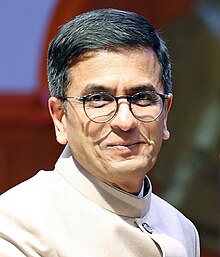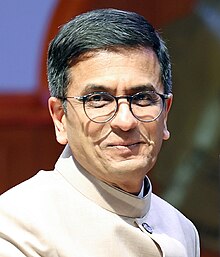Chief Justice DY Chandrachud is retiring today, and Justice Sanjiv Khanna will be sworn in as the new Chief Justice tomorrow.

Chief Justice of India DY Chandrachud spoke at a farewell event the Supreme Court Bar Association organized. He recalled an exchange he had with former Chief Justice YV Chandrachud, his father. The conversation was about a flat in Pune.
“He purchased a tiny apartment in Pune. I questioned him, ‘What’s the reason for buying an apartment in Pune? When do you plan to live there?’ He answered, ‘I’m aware I’ll probably never stay there. I can’t predict how long I’ll be with you. But hold onto this apartment until you finish your term as a judge.’ I wondered why.
His response was, ‘If you ever feel like your moral or intellectual integrity is under threat, remember you have a secure place to live. Don’t let yourself be compromised, either in your role as a lawyer or as a judge, due to lack of a personal space’,” the Chief Justice shared this father-son conversation. The Chief Justice noted his father’s sturdy discipline. “He didn’t actively enforce rules on us as kids, though. His philosophy was that we could learn the principle of discipline by observing his disciplined lifestyle,” he added.
The Chief Justice’s family was also present at the event. Reflecting on his mother, he shared, “As a sickly child, I often fell ill, and my mother stayed awake countless nights to care for me. I still hear her saying, ‘Medicine is like the Ganges, and the doctor is like Narayan (god).’ While I was growing up, she told me, ‘I named you Dhananjay, but ‘dhan’ refers not to material wealth; I want you to seek knowledge.'”
The Chief Justice’s mother, Prabha Chandrachud, was a classical musician with All India Radio.
“She was a powerful presence, typical of many Maharashtrian women. She truly dominated our home,” the Chief Justice reflected. He then drew a comparison that earned him warm applause: “I believe the women of Odisha are quite similar. My wonderful wife, Kalpana, runs the household but never interferes with my judgments.”
The head judge acknowledged his childhood had some discipline, but it wasn’t excessive. “They let me savor my youth, my parents didn’t force their aspirations upon me,” he said. They never attempted to push their aspirations through me.”
He also reminisced about a household helper named Bhimabai Bhanu Kamath. “She was illiterate and learned to write her name only after joining our family. When I was very sick, she took care of me and taught me so much about life beyond the urban world I grew up in. Despite my father becoming a judge, she ensured I spent time with friends from less privileged backgrounds. One of my best friends used to wear two pairs of shorts—not because he had a lot, but to cover up the holes in his clothes,” he said, adding that he and his sister think about Bhimabai nearly every day.
The Chief Justice also shared a memory of his father’s guidance when it came time for him to choose a subsidiary subject at Delhi University. “Most of my friends opted for philosophy, which you could study in a single evening and still pass. But my father insisted that I take Hindi. I only knew Bambaiya Hindi at the time, but he was firm about it, and it was a tough decision.”
He explained that learning Hindi introduced him to the works of celebrated writers like Mahadevi Verma, Jaishankar Tripathi, Nirala, Ramdhari Singh Dinkar, and Munshi Premchand. “Nearly 30 years later, when I was set to go to the Allahabad High Court, I realized how valuable that education was. Quite often, discussions in English would wrap up with ‘Please, your lordship.’ But speaking Hindi helped me connect with lawyers on a deeper level. They recognized my linguistic limitations but appreciated my reaching out in a language that resonated with them. That taught me an important lesson about connecting with people in ways that truly matter to them.”

